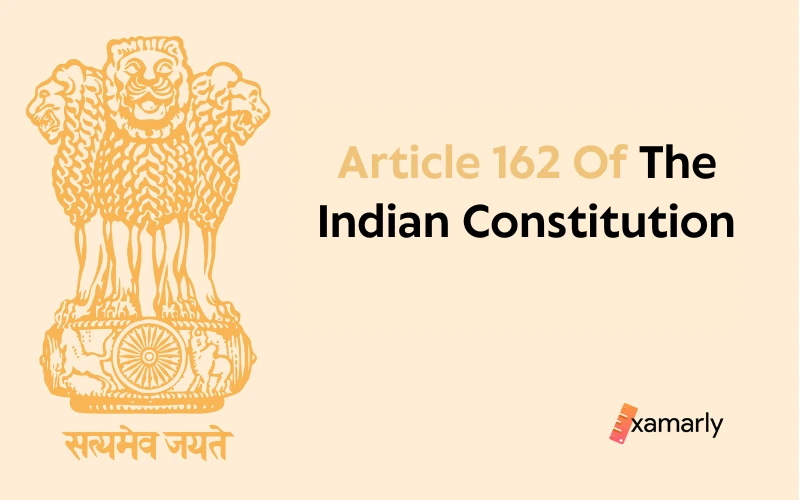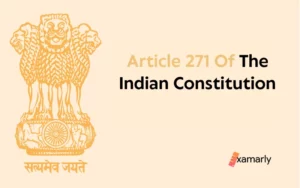Article 162 of the Indian Constitution delves into the breadth of the state’s executive authority.
The parameters of the State’s executive power are set forth in article 162 when read in conjunction with article 246.
The State’s legislative and executive power overlap.
In cases when a matter is on the Concurrent List, the executive authority of the State is subject to the authority granted to the Union by the Constitution or the statutes.
This informative article will give you valuable insight into the meaning of Article 162.
What is Article 162 of the Indian Constitution?
The Constitutional Provisions of Article 162 are as follows:
According to the rules of this Constitution, a State’s executive power extends to the matters with respect to which their Legislature has the power to create laws.
With the caveat that, in any situation where both the legislature of a State and Parliament have the authority to enact laws, the executive power of the State must be subject to and constrained by the executive authority specifically granted by this Constitution or by any law enacted by Parliament upon the Union or authorities thereof.
Detailed Analysis of Article 162
This article is based on the 7th Schedule of the Indian Constitution, which outlines the division of duties and responsibilities between Union and State governments. Union List, State List, and Concurrent List are the three lists into which these powers are broken down.
When it comes to the creation of laws, the Union Government, working through the Indian Parliament, has unrestricted authority over the subject matter that is part of the Union List.
The governments of the states have the same authority to make legislation on issues that are on the State List.
On the other hand, in regard to issues that are on the Concurrent List, both the Union and the States have the jurisdiction to establish laws.
In the event that there is a disagreement, the decision made by the central government will be upheld.
What Article 162 seeks to grant is related to the second and 3rd lists.
When it comes to matters included in the State List of the Seventh Schedule of the Indian Constitution, the executive power of the respective states is unquestioned.
This jurisdiction extends to the Concurrent List since state lawmakers also have the capacity to legislate on any of the topics that are featured on the Concurrent List.
Nevertheless, neither the states nor the Indian Parliament has the power to pass laws that would circumvent the Constitution or any other applicable laws.
The authority is distributed to both parties in this fashion.
This Article specifically mentions the authority expansion to the Concurrent list when it states that the executive power of the States shall also embrace topics where the State Legislature of the State has the capacity to legislate.
Conclusion
This Article is not concerned with defining the nature of executive power or function; rather, it focuses on how certain functions are delegated within a given state.
According to Article 162, the State executive’s functions are not limited to those subjects for which the States have already passed laws but rather encompass all subjects over which the State has the ability or jurisdiction to legislate or enact laws. In a similar vein, the Constitution specifies the bounds of the executive power that the Union possesses in Article 73 of the Indian Constitution.
The language of Article 162 states that a state’s executive power extends as far as its legislative power.
In the Concurrent List, often known as the third List, the executive authority of the State would be subject to any laws vesting execution power on the Union.
To the degree that the Union Authorities/Government are given the authority to carry out a law pertaining to a matter included in the Concurrent List, either through legislation passed by Parliament or the Constitution itself, the executive powers of the State are negated.
For Further Readings:
| Advisory Jurisdiction Of Supreme Court | Article 156 Of The Indian Constitution (Term Of Office Of Governor) |
| Article 157 Of The Indian Constitution (Qualifications For Appointment As Governor) | Article 158 Of The Indian Constitution |
| Types Of Writs In India | Writ of Habeas Corpus |
FAQs on Article 162
What Article 162 of the Indian Constitution deals with?
The scope of the state’s executive authority is covered in length in Article 162 of the Indian Constitution. It is enshrined in Part VI of the Constitution.
What does Article 73 deal with?
Article 73 of the Indian Constitution specifies the extent of the Union’s executive authority. It makes it crystal clear that the executive authority over the Union would be entrusted to the parliament. The aforementioned Article grants the executive authority the authority to make decisions regarding subjects that fall under the jurisdiction of the Union legislature.
What is the Executive Power of the State?
The ability to run the State and carry out commands is known as executive power. The executive function and the permissible acts that would fall under its purview are not defined in either article 162 or article 73. The text of article 162 makes it apparent that the State executive’s authority extends to subjects on which the State Legislature has the authority to establish laws and is not limited to those for which legislation has already been passed. Similarly, article 73 of the Constitution rests on the same fundamental idea.
What is the 7th Schedule of the Constitution of India?
The allocation of power and responsibilities between the Union (Centre) and the States is outlined in the 7th Schedule of the Indian Constitution.
What is Article 246 of the Constitution of India speak?
The subjects of legislation created by state legislatures and by Parliament are covered in Article 246 of the Indian Constitution.






